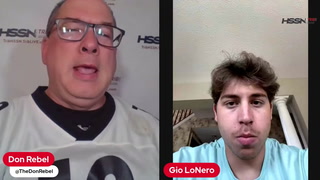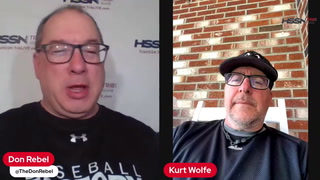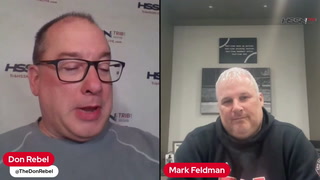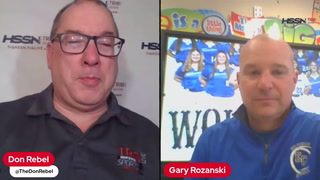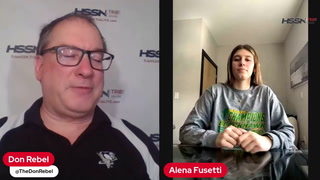High school sports proposal would separate public, private playoffs, ax PIAA transfer restrictions
By:
Tuesday, June 11, 2019 | 10:57 AM
Public and private high schools will compete for separate state championships, and strict transfer rules will vanish under the “Parity in Interscholastic Athletics Act” introduced Tuesday by a Western Pennsylvania state representative.
“This impacts hundreds of thousands of students,” said state Rep. Aaron Bernstine (R-Beaver/Butler/Lawrence) while announcing his legislation at a news conference in Harrisburg. “This legislation is not just about trophies and rings and banners. This is also about making sure students are protected.”
If approved by the state house, senate and Gov. Tom Wolf, the legislation would change the landscape of high school sports in Pennsylvania greatly.
The bill splits public and nonpublic schools into separate postseason tournaments in eight team sports that showed a statistical disparity: football, boys and girls basketball, baseball, softball, boys and girls soccer and girls volleyball. The split would occur only in PIAA tournaments, Bernstine said, not during the regular season or district playoffs such as the WPIAL’s.
Bernstine was joined at the Capitol by Pennsylvania Catholic Conference executive director Eric Failing, Laurel superintendent Leonard Rich and Millcreek Township superintendent Bill Hall. Rich and Hall are leaders of the Pennsylvania Athletic Equity Committee, a group of public school advocates who believe private schools hold an unfair competitive advantage.
Failing, Hall, Rich and Bernstine met numerous times in the past year to negotiate this legislation.
“This is a big change, and we’ve worked really, really hard together,” Failing said. “This has been a fantastic partnership between the public schools, the legislature and the private schools. But change can be scary. Please don’t make any snap judgments or any snap decisions until you get a chance to fully take a look at the legislation. I think we made a lot of very, very positive steps in this bill.”
#PIAA Legislation has been released. I@look forward to working with my colleagues to pass this negotiated legislation. pic.twitter.com/WGBCuQ0Gig
— Aaron Bernstine (@AaronBernstine) June 11, 2019
This legislation follows months of lobbying by the PAEC, which strongly urged the PIAA to split schools into separate tournaments. PIAA executive director Bob Lombardi consistently has said the PIAA has no interest in such a move and insisted the split would be impossible under state legislation from 1972.
Lombardi on Tuesday called Bernstine’s legislation “poorly crafted at best.”
Under the proposed playoff format, a public school and a nonpublic school state champion will be crowned. Those teams then would play one another for the overall state trophy.
The nonpublic bracket would include private and parochial schools. Charter schools would be grouped with traditional public schools in the other bracket.
Rich said he is sure some public school coaches and athletes will be disappointed charter schools aren’t on the nonpublic side. Charter schools are, legally, public schools, Bernstine said, so there was no way around that.
“What we have represents a compromise,” Rich said. “What we have represents something significantly better than what was created as a result of 1972 (legislation). If any of us thought we were going to go in and get anything and everything that we wanted, we’re foolish.
“This country has lost the art of compromise. We think that this is a great example of what legislation should be.”
Bernstine is the second state representative in five months to wade into the long-simmering public vs. private debate. State Rep. Scott Conklin (D-Centre) proposed legislation in February but without the backing of the Catholic Conference or the PAEC.
Along with separating public and private schools, Bernstine’s bill also makes athletes free to switch schools with little restriction. Under current PIAA rules, students cannot transfer for athletics.
Now, they could.
“I know some people might not support the transfer piece, but I’ve said all along that kids should be allowed to go play where they want to play,” said Hall, whose Millcreek district includes Erie McDowell. “It’s a day and age of school choice. Kids can choose their school and get up and go between private, charter, cyber. But when you get to PIAA competition, we had these transfer rules and all these hearings pitting families against each other. I just think that’s unhealthy.”
In a statement, the PIAA broadly criticized plans to eliminate transfer rules. In recent years, the PIAA board added restrictions including a postseason ban in an attempt to discourage athlete-related transfers.
“It requires little research to see what has happened in states that permit open transfers,” the PIAA said. “AAU teams, shoe companies and other third parties promote consolidation of top athletes at ‘preferred’ schools, which result in powerhouses where schools simply reload each year with high-profile athletes.”
Bernstine said midseason transfer restrictions would remain, but others would not.
“Students have the ability to transfer from one school to another (under the act),” Bernstine said. “I think it’s important that students and parents are able to make a decision that’s best for them. Some of these stories that I’ve heard about students that are unable to participate in a sport are sickening.
“We are pretty much eliminating the entire (transfer rule),” he added. “We don’t want to hurt kids anymore. It’s been done for far too long.”
According to House Bill 1600: “A student shall be immediately eligible to participate in interscholastic athletics after transferring schools as long as the student meets all other eligibility standards” such as age, grade point average and maximum years of interscholastic competition.
In-season transfers would not be allowed “after more than one-half of the regular season contests have been played.”
The Pennsylvania Catholic Conference long has opposed any effort to split public and private schools into separate playoffs but supported this legislation because it included items Failing found beneficial.
Along with eliminating transfer rules, the bill would require the ratio of public to nonpublic representatives on each district committee be “proportional to the number of public and nonpublic schools” in the district. That would include the WPIAL board of directors, which has one nonpublic member.
The legislation also would prevent athletic leagues from excluding private and parochial schools or “blackballing” them from regular-season schedules, said Failing, the Catholic Conference director.
It also punishes teams that forfeit two games or more by banning them from the PIAA playoffs. Failing said some schools had used forfeits as a way to avoid facing private-school opponents.
“When you take a look at the legislation, it’s more than just separate playoffs,” Failing said. “That’s a component of the bill, but there are a lot of pieces.”
Chris Harlan is a TribLive reporter covering sports. He joined the Trib in 2009 after seven years as a reporter at the Beaver County Times. He can be reached at charlan@triblive.com.
More High School Other
• High school scores, summaries and schedules for April 24, 2024• High school scores, summaries and schedules for April 23, 2024
• High school scores, summaries and schedules for April 22, 2024
• High school sports schedules for April 22, 2024
• Penn-Trafford notebook: Warriors boys track looks to build off Wildcat Invitational win




